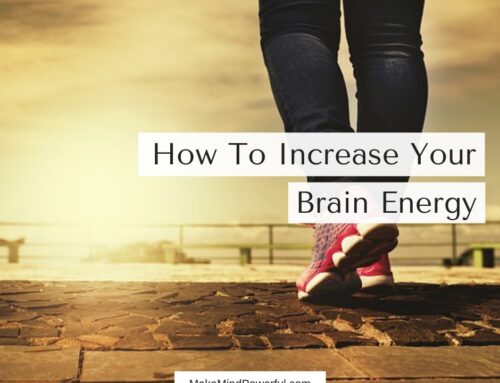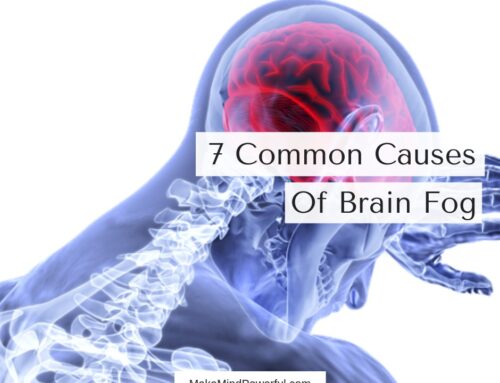Table of Contents
You woke up to the blaring sound of the alarm clock. It took you five minutes to realize that you have to start preparing your kids to school. What would have been a routine of making toasts, sunny side up and juices turned out to be a drag because you just can’t find the energy to focus.
As you turned up to work after dropping the kids to school, you realized that it’s going to be one of those days where your productivity took a nose dive. It took you more than 10 minutes to reply to an email, as you struggle to choose the right words to convey your message. It usually takes a couple of minutes on your best days.
Worse, you’re interrupted by furious knocking on the door to remind you that you’re 5 minutes late for a division meeting. You’re flustered as you couldn’t imagine how you could forget such an important event.
Sounds familiar? That’s what happened when you’re experiencing brain fog.
What Is Brain Fog?
Brain fog, or mental fog, is the foggy sensation in your mind where you have trouble memorizing, remembering, or focusing on usually mundane activities. The lack of mental clarity is not a medical condition itself but often a symptom of other underlying factors.
There are various factors that could result in the brain fog. For instance, if you’re having lesser sleep than usual, you could wake up feeling sluggish with the effect lasting throughout the days. But if you’re sure that you’re not lacking in sleep, you need to examine other factors.
If you’ve been depressed lately, it could explain the brain fog that you’re experiencing. According to UCLA researchers, depression is a major cause of memory issues amongst individuals of all ages. Of course, brain fog also happens when you develop allergies to gluten-based foods or experiencing a hormonal change during pregnancy.
Brain fog can also be a symptom of underlying conditions, such as diabetes, hypothyroidism, Alzheimer’s disease, lupus or a simple matter of dehydration. In some cases, taking certain medications can also lead to mental fog.
How To Clear Brain Fog
I’ve had my fair share of days when I struggled to lift the heavy blanket of fogs that are clouding my mind. I’ve personally tried these tips to regain mental clarity. However, I am obliged to say that the same method may not work for every episode of brain fog. It depends on the underlying cause of your foggy mind.
1. Sweating It Out
When it seems that you could barely figure out where you placed the car key, getting into a strenuous workout seems to be the last thing on your mind. After all, what would hitting the gym do to disperse off brain fog?
It may seem counterintuitive, but sweating it out is one of the best ways to bring focus to your mind, especially if it’s caused by stress or depression. You don’t have to literally commute to the gym as you could perform simple work out routine in the home.
What’s important is to exercise the body and increase the level of endorphin in your brain. You’ll know if it’s working when your mind gradually feels lighter as you keep running on the treadmill. As you finished the session, you’ll find yourself rejuvenated with no hints of the mental cobwebs.
2. Chia Seeds
Chia seeds are popular amongst individuals who are on a weight-loss regime. Personally, I’m not sure if there’s any effect for shedding off the extra weight in your body but I’m convinced that it lives out to its reputation as a superfood consumed by the Aztec.
These tiny seeds are native to South America and it was claimed to boost the stamina of ancient warrior. The seeds are packed with antioxidants, protein, vitamins, omega-3 and dietary fiber. Ever since trying out chia seeds, I’ve been relying on it for the additional brain power that keeps the mental fog at bay.
You could take chia seeds by mixing a teaspoon of it in yogurt, smoothie or any of your favorite food. It is tasteless and blends well with almost any recipe. Personally, I’m taking chia seeds by the teaspoon, and usually during the evening. That ensures I woke up the next morning with a fresh mind.
3. Drink Water
Considering that water makes up to 65% of your body, going long hours without drinking any can interrupt the various functions including cognitive ability. If you’ve been working on the computer and you feel that your mind is getting hazy, take a break and drink a glass of water.
I would prefer hot drinks as the warmth of the liquid jolts the brain up once it reaches the stomach. Ice cold beverage often causes the brain to remain unfocused.
4. Get Quality Sleep
Did you get caught up in Netflix till the wee hours of the night? Or does workplace stress causing insomnia? Either way, you may wake up with brain fog if you’re not getting a quality amount of sleep. Not only that, getting insufficient sleep may cause other mental health issues as well.
By quality, it means not only the amount of hour but also the time when you call it a night. Getting into sleep at 2 am may disrupt our working memory the next morning even if we’re having 7-8 hours of sleep. Once you’ve established the best sleep routine, stay with it.
If you’ve been struggling with insomnia and you sorely need a good night of sleep, you could try a cup of chamomile tea before bedtime. It never fails to doze me off into a slumber. Also, it helps to keep your room dark and avoid having mobile phones, tablets, and other distractive electronics device in the bedroom.
5. Take Supplements
Brain fog can be a symptom that your body is lacking in certain nutrients. For example, magnesium deficiency can result in the deterioration of mental health. On top of practicing a healthy lifestyle, you could take supplements to reduce occurrences of brain fogs.
Magnesium capsules one of the most common supplements to boost mental function. It helps to boost focus and working memory that are disrupting your daily activities. Besides minerals, you herbs like ginkgo biloba is also a known remedy for reducing brain fog.
You should always take supplements with precautions. Some supplements may interact with drugs, medical condition or affect pregnant ladies. To be safe, talk to your doctor before taking any supplement.
6. Avoid Caffeine
It will take all your willpower to resist the bitter aroma of espresso, but you have to strengthen your determination if you don’t want to make brain fog worse. Caffeine increases anxiety in most people and that leads to an unfocused mind.
You should banish any notion that taking coffee will eliminate brain fog. Occasionally, it does increase your alertness as the caffeine wreaks havoc in your system. But the aftermath as the effect wears off will bring you down crashing and you’ll feel worse off than ever.
7. A Moment Of Solitude
What you do the moment you woke up can have a major implication on the rest of your day. If you attempt to switch into high gear as you snapped out from slumber, you’ll stall and crash emotionally and mentally.
You have a better chance of starting the day with mental clarity when you take a moment to meditate or listening to relaxing music. It prevents your brain from getting overwhelmed by the list of stressors that you let in gradually.
Besides, meditation itself also helps you to improve focus and improve mental stamina. It isn’t hard to start meditating today, considering that there’s a dozen of guidance meditation app available. If you don’t know where to start, check out my experience with Aware.
Final Thoughts
There are days where you’ll pummel through brain fog with some of the above tips. But if you’re experiencing prolonged episodes of brain fog that lasts for weeks, it will be prudent to consult with your doctor.
How do you eliminate brain fog? Does any of these tips work for you? Share your thoughts in the comment below.
Related:
- Best Acetyl L-Carnitine Supplements For Cognitive Function
- How To Increase Focus And Concentration (6 Tips That Work)
- Amazing Mental Health Benefits Of Exercise
- How Positive Thinking Can Help Beat Sleep Anxiety
- Best Brain Boosting Supplements For Cognitive Performance









Leave A Comment